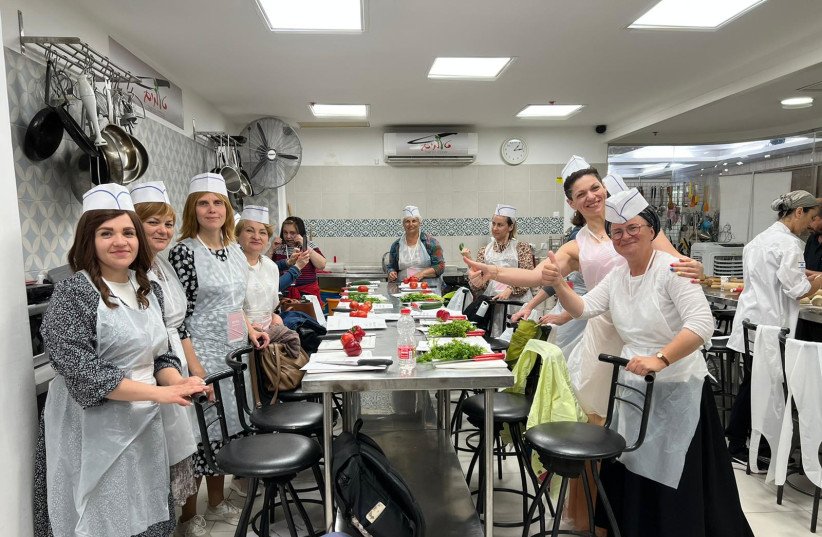Thirty women including Ukrainian refugees, new Russian olim (immigrants) and Israelis came together to hear their respective stories and reinforce their Jewish identity last week. All members of the group were alumni of Momentum, a global movement that helps women connect more deeply to their Jewish values and to the State of Israel by bringing them on trips to the Jewish homeland.
Bringing women together
During a busy day in Jerusalem, the women participated in a cooking class, creative writing workshop, and art gallery tour. They also took time to share their harrowing stories of survival and escape, both from Ukraine and Russia.
The women came from seven different Momentum partner organizations, including The Jewish Agency for Israel and Chabad. Momentum organizers reached out to several networks to identify those who have fled Ukraine and Russia over the past two months and who also previously participated in the movement’s trips. After that research process, it provided the women with an inspiring day of introspection and support.
What is Momentum?

Momentum is a one-year program for Jewish women with limited connection to Israel that is launched with a visit to the country. The program targets Jewish people from around the world hoping they will fall in love with Israel and connect with their Jewish identity.
Twenty of the women recently immigrated to Israel and appreciated hearing stories from previous Israeli immigrants who have succeeded in adapting to life in the Jewish state.
Rachel Jakubovich, left Moscow in March with her daughter because of the Russian invasion of Ukraine in February. She felt the city was no longer recognizable as sanctions began to bite.
“I came with my daughter and with cash because my cards from Russia no longer work. It’s been surreal, but I’m happy to be surrounded by this network of complete support from other Jewish women,” she said.
“I’m here with Ukrainian women who back home would be considered an enemy, but here, they are my sisters," she said thoughtfully. "We may not have the same challenges. But now that we’re all new, we are in a similar situation and we are only interested in helping each other.”
That spirit of volunteering permeated the women, many of whom are working hard to help fellow Jews in Israel and back home.
One woman, for example, runs a medical supply store in Ukraine and often sends goods to volunteers there. Another makes clothes for kids in her community. Yet another set up a volunteering network enabling women to share how they can help refugees and olim from the region.
“For many of these women, their world turned upside down,” according to Anna Vainer, senior partner relations manager for Momentum. “We realized we have so many alumni coming to Israel on aliyah, and our Momentum sisters were eager to welcome them into the sisterhood and help in any way they could.
“We thought that this was the best way to help them create relationships and foster support from like-minded women as they get adjusted to their new life here in Israel,” she said.
“They feel lucky and privileged to be here and are committed to helping when they can,” Vainer said. “Their bond is a strong one and is not defined by politics.”
Diaspora Affairs Minister Nachman Shai, whose ministry is a partner in funding the movement said, “It’s a pleasure to see Jewish women from around the world experience Israel, embrace their Jewish heritage and learn about us and the Jewish people. It’s also truly wonderful to see women from so many parts of the Jewish world becoming immersed in the life of the Jewish people and connecting to their Jewish birthright,” he said.
“Jewish women have unparalleled influence over the direction of Jewish life and the future of Jewish people," the minister said. "They are the ones who make sure the compass of Jewish life is pointed in the right direction.”
Momentum Founding Director Lori Palatnik said that, “Many of these women were tired, hungry, and worn down. Some escaped to Romania, some to Poland, some to Moldova, but they didn’t care where they went, they only wanted to be safe. This is why now some of us speak French, some speak Spanish, and some speak Hebrew. Because generations ago Jews fled for their lives.
"Their story is our story.”
